- Home
- Lisa Smedman
The Forever Drug Page 5
The Forever Drug Read online
Page 5
Then I saw the fresh flowers. They were sitting in a cut-glass vase that looked as if it had been made more than a century ago, but which was clean and filled with fresh water. The vase held a spray of pink roses and was sitting on the ground in front of a granite headstone. The flowers were still fresh; I could smell their perfume. The name chiselled into the mottled gray tombstone was no longer legible, but I could just make out the latter part of the date. Whoever was buried here had died in the 1870s.
I heard a faint click and looked up. A few meters away, a woman was seated on a bench under an oak tree, facing me. She was sitting completely still and was downwind of me, which was why I hadn't noticed her earlier. Her hands were in her lap, holding something, and she was looking down at it. I changed my position so she was silhouetted by the lights in the street behind her, trying to get a better look ...
"Jane!" I exclaimed.
She looked up. From her startled expression, I could tell she didn't recognize me. I moved into the light.
"Who are you?" she asked.
For just a moment, I thought I had the wrong woman. But it was my Jane Doe all right. I'd know those eyes anywhere.
"It's me, Romulus," I said. "Remember? We met on Georges Island and you came back to the police station with me in a hover."
"We have never met before," she said in a voice as certain as death.
"We have," I assured her. "You just don't remember. Your memory is ... damaged."
She raised the object she held in her hands: the necklace. Silver glinted at her throat as she fastened it behind her neck.
"Why are you here, Jane?" I asked.
"I came here to meet...." Her voice trailed off, uncertain.
My hackles rose. Had Jane come here to meet a Halo dealer? Was it a corpselight that had frigged up her memory? But that didn't make sense; the troll seemed to have retained all of his mental faculties after "using" Halo. And Jane didn't have the yearning, fearful look I'd seen in the troll's eyes.
"I gave you the address of the Barrington Shelter this morning?" I said to her. "Did you go there?"
"I don't know. I woke up, and ... started walking around the city. I came here to visit my daughter."
I looked around the graveyard. "Here? At night?"
She pointed at the grave with the fresh flowers. "Matilda is buried just over there."
The idea that Jane could be the mother of someone who died nearly two centuries ago sent a shiver down my spine. Then I shook off the notion. It was impossible. Jane was suffering from amnesia, and, judging from that outburst in the hospital, possibly also a multiple-personality disorder. Spirits only knew what other mental illnesses she had. She was obviously delusional if she believed that the moldering bones that lay in the ground a few meters away were those of her daughter.
Wasn't she?
Jane unfastened the necklace and held it out toward me. "Look inside the locket," she said. "There's a picture of her there."
I wasn't about to touch anything silver. "You open it for me," I said.
She frowned, but did as I said.
"Hold it out so I can see it."
She undid the necklace and held it out for me.
I bent closer. Inside the locket was a tiny two-dimensional image, rendered in brown-black tones on a flat sheet of metal. It showed a middle-aged human woman. The portrait was faded, the image ghostly, but I could still make out the woman's image. Her hair was long, tied back in a bow. Her dress had a full skirt and white lace collar. It hung to her ankles, covering most of her button-up black boots.
I wasn't sure what to say. Should I humor Jane's delusion, or challenge it? The woman in the photo did indeed resemble Jane, but was as old as she was. Jane could have picked up the locket in a pawn shop, noticed the resemblance, and bought it for that reason.
"Nice photo," I murmured in a noncommittal voice. "It looks old."
"It's a tintype," Jane said. She snapped the locket shut, then ran a finger along its tarnished surface—a gesture that made it clear this was her most treasured possession. Then she refastened the necklace at her throat.
I looked around the burial grounds. Still no sign of any dealer. There were plenty of rough types on the sidewalks outside the burial grounds, but none of them showed any sign of being about to venture inside.
Jane was beginning to spook me. Not only was she wandering around a rough port city without any knowledge of where or who she was, she was putting complete trust in total strangers—which, apparently, was what I had become to her once more. Had I been a thief, it would have been all too easy to take the necklace from her. Despite its sentimental value, she'd practically handed it to me.
Jane's vulnerability touched me. She was a grown woman, and yet ... a child. When she yawned, I could see that she was barely keeping her eyes open. If I left her here, she'd probably curl up on the bench and sleep. I didn't want her to become fodder for a malicious ghost.
"You look tired," I told her. "Come on. I've got a place where you can doss down."
She looked at me, for just a moment, with narrowed eyes. She was sizing me up, weighing my offer.
"You'll have privacy," I assured her. "I usually sleep during the day. You can sleep on the couch. You wouldn't like my bed, anyway."
She stood. "All right."
We climbed over the fence and walked back up the hill to Robie Street. I could tell that Jane was exhausted, but she kept up the pace throughout the twenty-minute walk. We at last came to a house built in the last century, a tall and narrow two-story building with a sharply peaked roof. I led Jane around the side and opened the gate that leads to the back yard. Gem and I don't bother locking it, because there's plenty behind that gate to deter burglars: forty kilos of snarling menace, trained to take down an intruder in three seconds flat.
As soon as I stepped inside the gate, Haley caught my scent. She streaked across the yard toward me, running low and strong. When she reached me she skidded to a stop, chest down and hindquarters high, and gave a sharp, playful yip. Despite the greeting, she still remembered to do her job; she kept one eye on Jane at all times, watching for any threatening moves. But I knew there wouldn't be any problems. On our walk over, I'd warned Jane about Haley. And I hadn't smelled any fear on Jane when Haley had run at us. Her body language was perfect: relaxed, confident, non-threatening. She'd be fine.
Haley's a beautiful bitch, a pure-bred German shepherd without any of the hip problems that can plague that breed. In Gem's opinion, she's "too soft" for police work. But she's produced several litters of excellent puppies, many of whom have gone on to distinguish themselves with Lone Star's K9 patrols.
I bent down and let Haley lick my face, and gave her muzzle a quick kiss in return. You couldn't call what we had love—not in the way humans used the term, anyway. I had sired a couple of litters on Haley and she was fun to romp around with. But even though she was a smart dog, being with her wore thin after a while. You could only roughhouse and play for so long. I needed the intellectual stimulation that only humans and metas could provide. Still, I hoped Haley wouldn't be jealous of Jane.
Frig. Where had that thought come from? I must have been more attracted to the human woman than I cared to admit.
I closed the gate and led the way to the garage. That's where I doss down. It isn't much, by human standards. As I flicked on the light, I looked at the garage for the first time as it must appear to a human: unfurnished, spartan, a place where an animal would sleep. The only furniture was an old couch that I sometimes curled up on, a wooden table and a single chair for those rare occasions when I eat human food, a space heater, and the pile of blankets that is my bed. There wasn't much in the way of decoration— just a few holopics that I'd tacked up on the walls, landscapes that reminded me of the forest where I'd been born.
At home, inside the privacy of the fence, I usually shift into wolf form. It's much more comfortable. But in order to communicate with Jane I'd need to stay in human form. I brushed off the chair so she
could sit down. "Would you like something to eat?" I asked. "There isn't that much; I mostly eat out. But I could fix you something."
I opened a cupboard, shoving aside the cans of dog food and searching among the tins for something a human would find tasty. I wasn't having much luck.
"I'm not hungry," Jane said. "I think I'll just sleep."
She sagged onto the couch, arranging one of the cushions as a pillow. I picked up a blanket, intending to cover her with it, then realized it was thick with dog hair. It was also heavily impregnated with my scent. It smelled, quite frankly, of wet dog.
"Just a minute," I said, embarrassed. "I'll get you a blanket from the house."
A light was on in the house; Gem was still up and about. I knocked, and after a moment she came to the door. When Gem answered it, I asked to borrow a clean blanket. "Just for the night," I explained. "I've got a guest."
"Oh, really," Gem said, arching an eyebrow. "Would that be the good-looking woman I saw you bring home? You sure she's your type?"
One of the things I hate about human form is that you blush. I had hoped Gem wasn't looking out the window earlier, but I should have known better. Her senses are as keenly honed as Haley's.
Gem's an ork, and her night vision is excellent. She's short for her race, with a mop of unruly curls and wide hips that she says would make the perfect "breeding bitch." But she's never had any kids, as far as I know. Instead she devotes all of her time to her dogs—her "children."
She could sense my discomfort. Instantly, her body language changed. "Sure, Romulus," she said in a soft voice. "I'll get a blanket for you."
I waited on the back porch. In all the years I'd known Gem, I'd never entered her house. Well, not quite. There was that one time, but I'd felt awkward about it. The dogs weren't allowed inside, and I felt I was setting a precedent by entering the house, even if I was in human form. After a few uncomfortable minutes of sitting in the kitchen, I'd excused myself and gone back to the garage. Ever since that day, when Gem and I wanted to chat, we sat on the back porch.
Part of my respect for Gem comes from the fact that she's an expert dog trainer. She has a voice that commands attention like a whip crack, but she can also dish out praise, when appropriate, in a voice as pleasurable as a good belly rub. She's been training dogs for Lone Star's K9 patrols for at least ten years— longer than I've lived in Halifax. I'd heard she was involved, for a time, in some of Lone Star's experiments with training hell hounds as guard dogs. But after seeing the burns on her arms, I didn't want to ask her about that experience.
I lived rent-free in Gem's garage in return for helping her with the training. I demonstrated the moves, and the young dogs responded well to the occasional nip or growl from a "dog" so much larger and more powerful than themselves. But as I stood on the porch, waiting for Gem to get the blanket, I felt like a foolish puppy.
When she returned, I nodded a quick thanks and loped back to the garage with the blanket. Only to find Jane curled up, fast asleep, with the dog-haired blanket pulled up to her chin.
Gently, I removed it. Jane stirred only a little as I replaced it with the clean blanket. I thought I heard her murmur something in her sleep: a man's name. For just a moment, I felt a twinge of jealousy. Then I pushed that emotion aside. I squatted beside Jane and nuzzled her hand with my cheek. She looked beautiful when she was sleeping. Relaxed, at peace with herself.
The touch of my cheek on her hand was just enough to wake her up. Her eyes flew open wide, and her gold-flecked eyes bored wildly into mine.
"Please!" she whispered fiercely. "Don't let them take me..."
She blinked. Then she looked around the garage, and back at me, and seemed to realize where she was. As whatever thought had prompted her fearful outburst vanished, her face gradually relaxed.
"Don't worry," I said. "You're safe here."
She nodded, curled back into a ball, and closed her eyes. After a minute or two, her breath was slow and deep.
I stared down at Jane. Where was this urge to protect her coming from? Was this the first stirring of love that humans felt for one another? It seemed too soon, too fast; I'd only known Jane a day. I didn't even know if that was her real name.
Then I laughed at myself. What did "real" names matter? I hadn't had a name when I was born; Romulus was just a tag my first set of foster parents had given me. I still didn't have a "proper" last name. And what was identity, anyhow, to someone like me, someone who shifted between the worlds of animal and human every day?
My curiosity about Jane was growing. I knew the old adage: curiosity was what killed the cat. And cats are stupid creatures, when you get right down to it. So stupid that they're always poking their noses into other people's back yards, and getting chased up a tree for their troubles.
My curiosity wasn't going to get me into any trouble. I just wanted to know more about Jane. But where would I start searching for that first puzzle piece?
I had no idea. Unless...
No, that was ridiculous. It couldn't be true.
But there was only one way to find out.
6
It took me most of the morning to find the information I was looking for. I'd never been to the archives before, and it took a while to find what I wanted. And part way through the morning I had to leave the archives to pay another visit to the Old Burial Grounds so I could double-check the position of the grave, pacing out exactly where it lay.
But the effort paid off. There had been a Matilda buried under the headstone where Jane had left the bouquet last night. Matilda O'Reiley, born in 1798 and laid to rest in 1875 at the age of seventy-seven. The archives even had a record of the inscription placed on the grave, a verse by the poet Byron:
***
I took that hand which lay so still,
Alas! My own was full as chill...
I know not why I could not die.
***
An odd choice for an epitaph, but one that could be rationalized as a token of a mother's near-suicidal grief at the loss of a beloved daughter. It could also be taken as evidence that Jane really was more than two hundred years old.
Nobody lived that long. Except maybe elves. They were rumored to have life spans measured in centuries. But the first elves had only appeared in 2011, when magic returned to the world. The oldest elves were only in their fifties now—although some of them looked as though they were still in their early twenties, which was how the rumors about longevity got started.
Jane wasn't an elf. She didn't have pointy ears. At least, I didn't think she did. Her hair had hidden the tops of her ears, now that I thought about it. But even if she was an elf, she'd have to have been born after 2011.
What I'd uncovered in the archives had surprised me. But I still refused to believe it. Jane could have done the same legwork I had, could have looked up the old burial records and "adopted" one of the bodies of the cemetery. Even so, part of me wanted to believe her. Jane seemed so sincere, so certain. But weren't those the hallmarks of a true crazy?
And then there was that word she'd used in the scanning lab: sphygmomanometer. It had taken me a while to figure out the spelling, but when I had, the archivist had come up with an interesting detail. "Sphygmomanometer" was an old-fashioned word, the original name of a medical instrument invented in the 19th century: the blood pressure cuff. Where had Jane dug up a word like that?
I was preoccupied with these thoughts as I walked down the lane at the side of Gem's house. And I was sleepy. I didn't usually stay up until noon. But as soon as I saw the back gate hanging open, I tensed and came fully awake.
Something was wrong. The gate shouldn't have been open. Gem had gone out shopping today, but both she and I were always careful to close the gate— and Haley wouldn't have been able to open it on her own. No passerby in her right mind would ignore the red-lettered Beware Of Dog sign tacked on to the fence—and even if they did, Haley's barks would have frightened them off.
I suddenly realized that the yard was qui
et.
I dropped into a low crouch and sniffed. There was an odd smell, one that made my eye itch. Kind of like medicine, but stronger. I poked just the tip of my nose inside the gate; the smell was stronger inside the back yard. Then I looked—cautiously—into the yard.
I almost yelped when I saw Haley stretched out on the ground. For a heartbeat or two, I thought she was dead. Still in a crouch, I made my way over to her on clumsy human legs and touched a hand to her chest. She was still warm, still breathing. The strange medicine smell puffed from her nostrils with each breath she exhaled.
Haley's eyelids were flickering. She let out a soft whine. I stroked her cheek as her eyes opened, and murmured to her to lie still. She looked confused, but unhurt. I was relieved by the thought that she was already recovering from the drug.
I shot a glance at the house: nothing looked unusual there. Then at the garage. My hackles rose as I saw that the door was open. I couldn't tell, with my feeble human eyes, if anyone was inside. And so I changed, only remembering to tear off my clothes at the very last moment.
The garage was empty. There was no sign of Jane. None of the furniture had been disturbed, and there were no signs of violence. Had it not been for Haley, lying drugged in the yard, I might have thought that Jane had simply woken up and wandered away. She was unlikely to have remembered where she was, and would have had no compelling reason to stay.
No, someone had taken Jane away. His smell lingered in my doss like a bad spoor: a combination of sweat-damp wool fabric and musky cologne. He'd even left his mark in my toilet. I quickly covered its stench with my own spoor.
The worst part was, I had no idea whether he was friend or foe to Jane. Nor would she know. Even if he was a total stranger to her, Jane would have gone with him willingly.
I growled at the thought. Then I went to work.

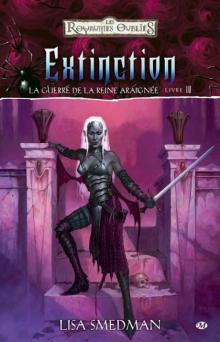 Extinction
Extinction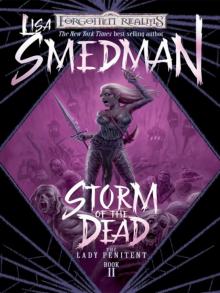 Storm of the Dead
Storm of the Dead Blood Sport
Blood Sport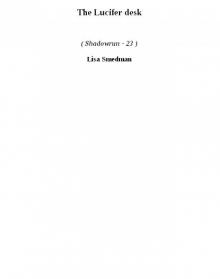 The Lucifer desk (s-2)
The Lucifer desk (s-2)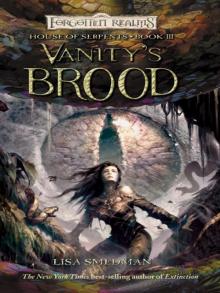 Vanity's Brood
Vanity's Brood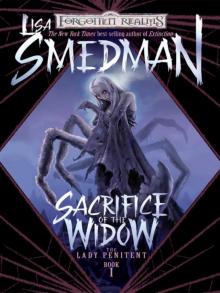 Sacrifice of the Widow
Sacrifice of the Widow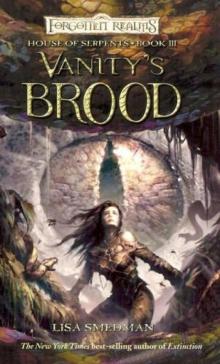 Vanity's brood hos-3
Vanity's brood hos-3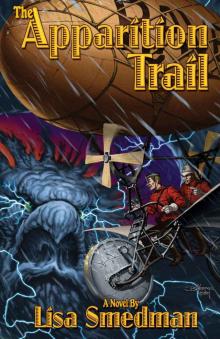 Apparition Trail, The
Apparition Trail, The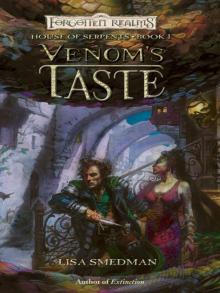 Venom's Taste
Venom's Taste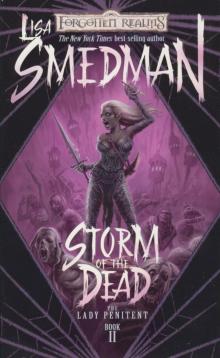 Forgotten Realms - The Lady Penitent - Storm of the Dead
Forgotten Realms - The Lady Penitent - Storm of the Dead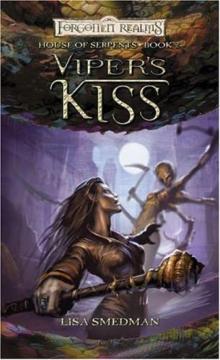 Viper's kiss hos-2
Viper's kiss hos-2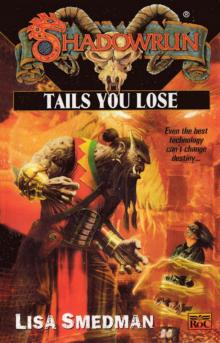 Tails You Lose
Tails You Lose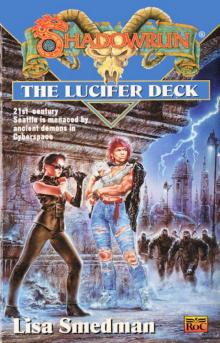 The Lucifer Deck
The Lucifer Deck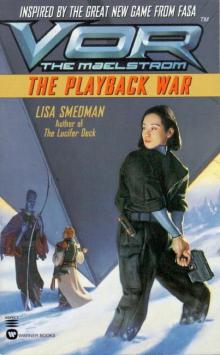 Vor: The Playback War
Vor: The Playback War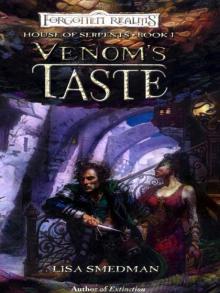 Forgotten Realms - House of Serpents 1 - Venom's Taste
Forgotten Realms - House of Serpents 1 - Venom's Taste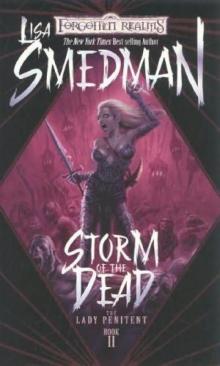 Storm of the Dead зкp-2
Storm of the Dead зкp-2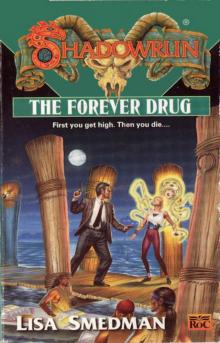 The Forever Drug
The Forever Drug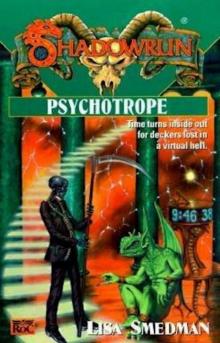 Psychotrope
Psychotrope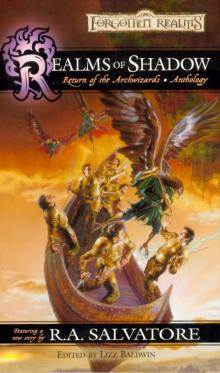 Realms of Shadow a-8
Realms of Shadow a-8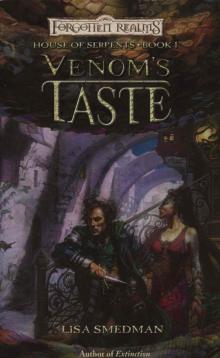 Venom’s Taste hos-1
Venom’s Taste hos-1 Psychotrope s-33
Psychotrope s-33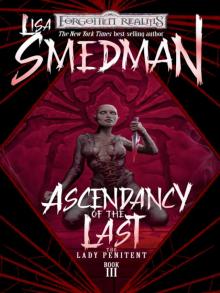 Ascendency of the Last
Ascendency of the Last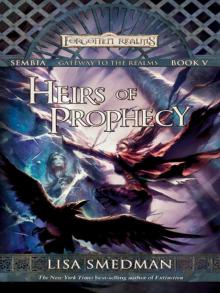 Heirs of Prophecy
Heirs of Prophecy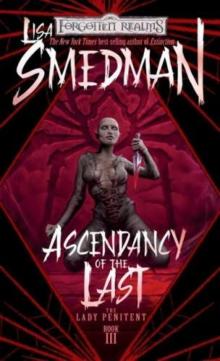 Ascendancy of the Last зкp-3
Ascendancy of the Last зкp-3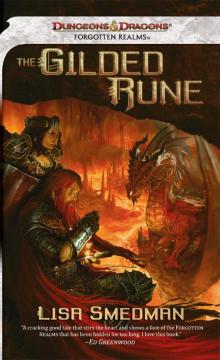 The Gilded Rune (forgotten realms)
The Gilded Rune (forgotten realms)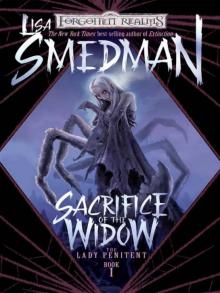 Sacrifice of the Widow: Lady Penitent, Book I
Sacrifice of the Widow: Lady Penitent, Book I The Lucifer desk s-23
The Lucifer desk s-23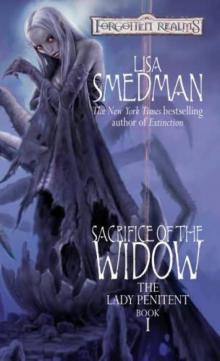 Sacrifice of the Widow lp-1
Sacrifice of the Widow lp-1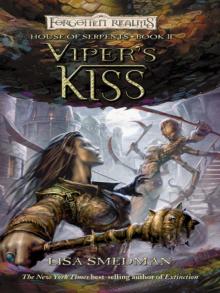 Viper's Kiss
Viper's Kiss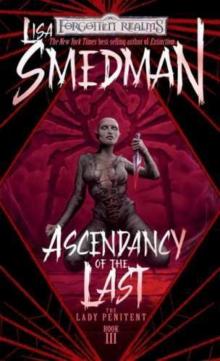 Forgotten Realms - The Lady Penitent - Ascendancy of the Last
Forgotten Realms - The Lady Penitent - Ascendancy of the Last